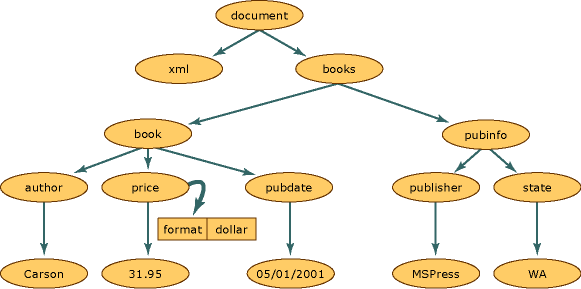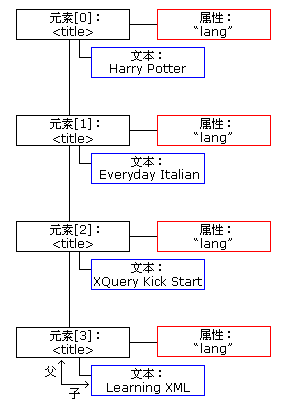http://msdn.microsoft.com/zh-cn/library/vstudio/hf9hbf87.aspx
<?xml version="1.0"?> <books> <book> <author>Carson</author> <price format="dollar">31.95</price> <pubdate>05/01/2001</pubdate> </book> <pubinfo> <publisher>MSPress</publisher> <state>WA</state> </pubinfo> </books>

在 XML 文档结构中,此图中的每个圆圈表示一个节点(称为 XmlNode 对象)。
XmlNode 对象是 DOM 树中的基本对象。
XmlDocument 类(扩展XmlNode)支持用于对整个文档执行操作(例如,将文档加载到内存中或将 XML 保存到文件中)的方法。
此外,XmlDocument 提供了查看和处理整个 XML 文档中的节点的方法。 XmlNode 和 XmlDocument 都具有性能和可用性增强,并通过方法和属性执行下列操作:
-
访问和修改 DOM 特定的节点,如元素节点、实体引用节点等。
-
除检索节点包含的信息(如元素节点中的文本)外,还检索整个节点。
Node 对象具有一组方法和属性以及基本的和定义完善的特性。其中的某些特性包括:
-
节点有单个父节点,父节点是与节点相邻的上一级节点。唯一没有父级的节点是文档根,因为它是顶级节点,包含了文档本身和文档片段。
-
大多数节点可以有多个子节点,子节点是与节点相邻的下一级节点。以下是可以有子节点的节点类型列表。
-
Document
-
DocumentFragment
-
EntityReference
-
Element
-
Attribute
XmlDeclaration、Notation、Entity、CDATASection、Text、Comment、ProcessingInstruction 和 DocumentType 节点没有子节点。
-
-
处于同一级别、在关系图中由 book 和 pubinfo 节点表示的节点是同级。
DOM 的一个特性是处理属性的方式。属性是不属于父子关系和同级关系的节点。属性被视为元素节点的属性,由名称和值对组成。
例如,如果存在由与元素price 关联的 format="dollar" 组成的 XML 数据,则单词 format 是名称,format 属性的值是 dollar。
为检索 price 节点的 format="dollar" 属性,可以在游标位于 price 元素节点时调用 GetAttribute 方法。有关更多信息,请参见访问 DOM 中的属性。
http://linder0209.iteye.com/blog/1458823
http://www.css88.com/archives/5017
(一)nodeName 属性含有某个节点的名称。
元素节点的 nodeName 是标签名称
属性节点的 nodeName 是属性名称
文本节点的 nodeName 永远是 #text
文档节点的 nodeName 永远是 #document
注释:nodeName 所包含的 XML 元素的标签名称永远是 大写 的
nodeName 属性含有某个节点的名称。
- 元素(element)节点的 nodeName 是标签名称
- 属性(attribute)节点的 nodeName 是属性名称
- 文本(text)节点的 nodeName 永远是 #text
- 文档(document)节点的 nodeName 永远是 #document
(二)nodeValue
对于文本节点,nodeValue 属性包含文本。
对于属性节点,nodeValue 属性包含属性值。
nodeValue 属性对于文档节点 <document> 和元素节点 <element> 是不可用的。
(三)nodeType
nodeType 属性可返回节点的类型。
最重要的节点类型是:
元素类型 节点类型
元素element 1
属性attr 2
文本text 3
注释comments 8
文档document 9
http://www.w3schools.com/dom/dom_nodetype.asp
Node Types
The following table lists the different W3C node types, and which node types they may have as children:
| Node type | Description | Children |
|---|---|---|
| Document | Represents the entire document (the root-node of the DOM tree) | Element (max. one), ProcessingInstruction, Comment, DocumentType |
| DocumentFragment | Represents a "lightweight" Document object, which can hold a portion of a document | Element, ProcessingInstruction, Comment, Text, CDATASection, EntityReference |
| DocumentType | Provides an interface to the entities defined for the document | None |
| ProcessingInstruction | Represents a processing instruction | None |
| EntityReference | Represents an entity reference | Element, ProcessingInstruction, Comment, Text, CDATASection, EntityReference |
| Element | Represents an element | Element, Text, Comment, ProcessingInstruction, CDATASection, EntityReference |
| Attr | Represents an attribute | Text, EntityReference |
| Text | Represents textual content in an element or attribute | None |
| CDATASection | Represents a CDATA section in a document (text that will NOT be parsed by a parser) | None |
| Comment | Represents a comment | None |
| Entity | Represents an entity | Element, ProcessingInstruction, Comment, Text, CDATASection, EntityReference |
| Notation | Represents a notation declared in the DTD | None |
Node Types - Return Values
The following table lists what the nodeName and the nodeValue properties will return for each node type:
| Node type | nodeName returns | nodeValue returns |
|---|---|---|
| Document | #document | null |
| DocumentFragment | #document fragment | null |
| DocumentType | doctype name | null |
| EntityReference | entity reference name | null |
| Element | element name | null |
| Attr | attribute name | attribute value |
| ProcessingInstruction | target | content of node |
| Comment | #comment | comment text |
| Text | #text | content of node |
| CDATASection | #cdata-section | content of node |
| Entity | entity name | null |
| Notation | notation name | null |
NodeTypes - Named Constants
| NodeType | Named Constant |
|---|---|
| 1 | ELEMENT_NODE |
| 2 | ATTRIBUTE_NODE |
| 3 | TEXT_NODE |
| 4 | CDATA_SECTION_NODE |
| 5 | ENTITY_REFERENCE_NODE |
| 6 | ENTITY_NODE |
| 7 | PROCESSING_INSTRUCTION_NODE |
| 8 | COMMENT_NODE |
| 9 | DOCUMENT_NODE |
| 10 | DOCUMENT_TYPE_NODE |
| 11 | DOCUMENT_FRAGMENT_NODE |
| 12 | NOTATION_NODE |
http://www.w3school.com.cn/xmldom/dom_nodes_nodelist.asp
<bookstore> <book category="children"> <title lang="en">Harry Potter</title> <author>J K. Rowling</author> <year>2005</year> <price>29.99</price> </book> <book category="cooking"> <title lang="en">Everyday Italian</title> <author>Giada De Laurentiis</author> <year>2005</year> <price>30.00</price> </book> <book category="web" cover="paperback"> <title lang="en">Learning XML</title> <author>Erik T. Ray</author> <year>2003</year> <price>39.95</price> </book> <book category="web"> <title lang="en">XQuery Kick Start</title> <author>James McGovern</author> <author>Per Bothner</author> <author>Kurt Cagle</author> <author>James Linn</author> <author>Vaidyanathan Nagarajan</author> <year>2003</year> <price>49.99</price> </book> </bookstore>
下面的图像表示 "books.xml" 中 <title> 元素的节点列表:

Xml.XMLIntf.IXMLNode.NodeType
Indicates the type of the node.
Read NodeType to determine the type of the node. The type reflects the way the node is used in the XML document.
TNodeType = (
ntReserved,
ntElement,
ntAttribute,
ntText,
ntCData,
ntEntityRef,
ntEntity,
ntProcessingInstr,
ntComment,
ntDocument,
ntDocType,
ntDocFragment,
ntNotation);
Xml.XMLIntf.IXMLNode.NodeName
Indicates the node name.
NodeName is the name of the underlying DOM node.
The node's name depends on the type of the node, as indicated in the following table:
| NodeType | NodeName |
|---|---|
|
ntAttribute |
The attribute name |
|
ntElement |
The tag name |
|
ntText |
'#text' |
|
ntCData |
'#cdata-section' |
|
ntEntityRef |
The name of the entity reference. |
|
ntEntity |
The entity name |
|
ntProcessingInstr |
the target of the processing instruction |
|
ntComment |
'#comment' |
|
ntDocument |
'#document' |
|
ntDocType |
The document type name |
|
ntDocFragment |
'#document-fragment' |
|
ntNotation |
The notation name |
Xml.XMLIntf.IXMLNode.NodeValue
Specifies the value of this node.
Use NodeValue to get or set the value of the node. The meaning of a node's value depends on the type of the node, as indicated in the following table:
| NodeType | Value |
|---|---|
|
ntAttribute |
The attribute value |
|
ntElement |
If the element contains only text, this is that text value. Otherwise, trying to read or set NodeValue causes an exception. |
|
ntText |
The text |
|
ntCData |
The content of the CDATA section. |
|
ntProcessingInstr |
The content of the processing instruction except for the target. |
|
ntComment |
The value (text) of the comment. |
Xml.XMLIntf.IXMLNode.IsTextElement
Indicates whether the node has a single text value.
Read IsTextElement to determine whether this node represents a single text value. For example, if the node represents the following:
<Title> Understanding XML </Title>
IsTextElement is true, because the node represents a tagged element and the text that is its value.
Note:
In the underlying DOM implementation, nodes for which IsTextElement is true are element nodes that have a single child node that is a text node.
IXMLNode flattens this out so that you can use the element node to work with the text value (through the Text property),
rather than requiring you to use a separate node for the text value.